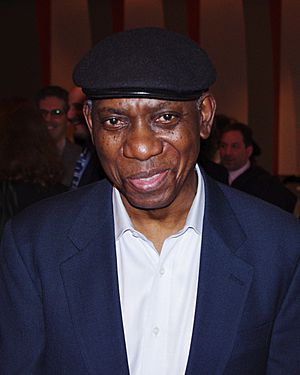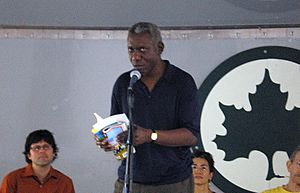Yusef Komunyakaa facts for kids
Quick facts for kids
Yusef Komunyakaa
|
|
|---|---|

Komunyakaa at the 2011 National Book Critics Circle Awards in March 2012; his book The Chameleon Couch was nominated for the poetry award.
|
|
| Born | James William Brown April 29, 1941 Bogalusa, Louisiana, U.S. |
| Education | University of Colorado, Colorado Springs (BA) Colorado State University (MA) University of California, Irvine (MFA) |
| Genre | Poetry |
| Notable works | "Facing It" "Neon Vernacular" "Talking ... to the Gods" |
| Notable awards | Kingsley Tufts Poetry Award; Pulitzer Prize for Poetry; Ruth Lilly Poetry Prize; Zbigniew Herbert Award. |
Yusef Komunyakaa (born James William Brown on April 29, 1941) is a famous American poet. He teaches at New York University and is part of the Fellowship of Southern Writers. Komunyakaa has won many important awards for his poetry. These include the 1994 Kingsley Tufts Poetry Award and the 1994 Pulitzer Prize for Poetry for his book Neon Vernacular. He also received the Ruth Lilly Poetry Prize and the 2007 Louisiana Writer Award.
His poems often explore the experiences of Black people, life in the Southern United States before the Civil Rights Movement, and his time as a soldier in the Vietnam War.
Life and Early Career
Yusef Komunyakaa was born James William Brown in 1941. He was the oldest of five children. His father was a carpenter. He grew up in a small town called Bogalusa, in Louisiana. As an adult, he chose to use the name Komunyakaa. This name was said to be his grandfather's African name. His grandfather came to the United States from Trinidad.
Komunyakaa served in the US Army during the Vietnam War. He worked for a military newspaper called Southern Cross. He wrote stories about soldiers and published articles on Vietnamese history. For his work, he earned a Bronze Star award. His experiences in the war later became the focus of his poetry books. These include Toys in a Field (1986) and Dien Cai Dau (1988). The title Dien Cai Dau comes from a Vietnamese term for American soldiers. Komunyakaa has shared that returning home was difficult. He felt that people in America did not welcome Vietnam veterans. This was as painful as the racism he faced growing up in the American South.
Education and Teaching
After his time in the army, Komunyakaa went to college. He studied at the University of Colorado, Colorado Springs. There, he helped edit the campus arts magazine, riverrun. He started writing poetry in 1973 and began using the name Yusef Komunyakaa. He earned his master's degree in writing from Colorado State University in 1978. He then got another master's degree in creative writing from the University of California, Irvine, in 1980.
After finishing his studies, Komunyakaa started teaching. He taught poetry in public schools in New Orleans. He also taught creative writing at the University of New Orleans. Later, he became a professor at Indiana University Bloomington. In 1997, he moved to Princeton University. Today, Yusef Komunyakaa is a professor in the Creative Writing Program at New York University.
His Poetry Works
Komunyakaa's book I Apologize for the Eyes in My Head came out in 1986. It won the San Francisco Poetry Prize. He gained more attention with Dien Cai Dau (1988). This book focused on his experiences in Vietnam. It won the Dark Room Poetry Prize. One famous poem from this book is "Facing It." In this poem, the person speaking visits the Vietnam Veterans Memorial in Washington, D.C.:
- He's lost his right arm
- inside the stone. In the black mirror
- a woman's trying to erase names
- No, she's brushing a boy's hair.
- — from "Facing It"
Komunyakaa has published many other poetry collections. Some of these include Taboo: The Wishbone Trilogy, Part I (2004), Pleasure Dome: New and Collected Poems, 1975–1999 (2001), Talking ... to the Gods (2000), Thieves of Paradise (1998), Neon Vernacular (1994), and Magic City (1992).
In 2004, Komunyakaa started working with theater producer Chad Gracia. They created a play based on The Epic of Gilgamesh. This play was published in 2006. It has been performed on stage, including a full production in Washington, D.C., in 2013.
Komunyakaa describes his own poetry as a way of "insinuation." He means that poetry doesn't always say things directly. Instead, it hints at ideas and questions. He believes this indirect way can sometimes say more than a direct approach.
Interviews and Influences
Over the years, Komunyakaa has talked about his life and work in many interviews. In one interview from 2018, he spoke about using language carefully. He also discussed how his experiences influenced famous poems like "Facing It." He compared his work to that of a painter or a carpenter. He said that poetry is different from journalism because it can be more intense, like nature.
In another interview, Komunyakaa shared how the Bible influenced his writing. He remembered reading the Bible when he was young. He found poetic elements hidden within its stories. He also honored early poets who inspired him. These include Langston Hughes, Paul Laurence Dunbar, and Phillis Wheatley.
In a 2010 interview, Komunyakaa was asked about the people who influenced him most. He named poets like Robert Hayden, Bishop, Pablo Neruda, and Walt Whitman.
 | Jessica Watkins |
 | Robert Henry Lawrence Jr. |
 | Mae Jemison |
 | Sian Proctor |
 | Guion Bluford |


